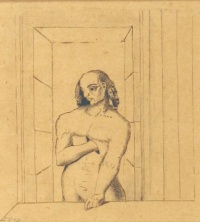Eros Denied
From The Art and Popular Culture Encyclopedia

Illustration: The Heart Has Its Reasons (c.1887) by Odilon Redon
|
"It is often observed that psychoanalysis only flourishes in Protestant countries and presumably fills the same need as confession does in Catholic countries. But there are other resemblances. The fee fulfills the function of the tithe, the transference of the repentance, the long, long schedule of visits, of penance, and the reintegration of personality fulfills the same function as the absolution. The training analysis, where a fledgling psychoanalyst is analyzed by a fully qualified one, corresponds to the laying on of hands in ordination." --Eros Denied (1964) by Wayland Young "Boucher painted the book of libertinism, and Nerciat described the feel of it. Laclos wrote down its rules in vitriol and thereby destroyed it." --Eros Denied (1964) by Wayland Young "A prick is of course that which pierces, but the neighbouring roots in Skeat are PRAT or PLAT, to be extended or unfolded, PRI or FRI to love (giving friend among other words) and PRU, to spring up or jump up (giving frolic and frog)." --Eros Denied (1964) by Wayland Young
|
|
Related e |
|
Featured: |
Eros denied; sex in western society is a 1964 book by Wayland Young on erotic expression and its exclusion throughout history. It is a history of sexual repression in Europe from ancient to modern times, offering many anecdotes and examples. The book was published by Grove Press and is typical for the make love, not war aethos of that era.
Contents |
Taxonomy
Wayland Young divides erotic works into no less than five (overlapping) categories — "The Comic", "The Perverse", "The Haptic-Convulsive", "The All-Out-Pornographic", and "The Celebratory."
TOC
PART I
The introduction extensively quotes from Montaigne's Essay on Virgil (Essays (Montaigne)).
p.15:
- "On the one side, nature pushes us on to it, having fixed the most noble, useful, and pleasant of all her functions to this desire: and, on the other side, leaves us to accuse and avoid it, as insolent and indecent, to blush at it, and to recommend abstinence. Are we not brutes to call that work brutish which begets us? "
- "Every one avoids seeing a man born, every one runs to see him die; to destroy him a spacious field is sought out in the face of the sun, but, to make him, we creep into as dark and private a corner as we can: 'tis a man's duty to withdraw himself bashfully from the light to create; but 'tis glory and the fountain of many virtues to know how to destroy what we have made: the one is injury, the other favour: for Aristotle says that to do any one a kindness, in a certain phrase of his country, is to kill him. The Athenians, to couple the disgrace of these two actions, having to purge the Isle of Delos, and to justify themselves to Apollo, interdicted at once all births and burials in the precincts thereof:"
- "Nostri nosmet paenitet." ["We are ashamed of ourselves."--Terence, Phormio, i. 3, 20.]
p.21:
- Those worthy people stood in need of no subtlety to disguise their meaning; their language is downright, and full of natural and continued vigour; they are all epigram; not only the tail, but the head, body, and feet. There is nothing forced, nothing languishing, but everything keeps the same pace:
- "Contextus totes virilis est; non sunt circa flosculos occupati."
- ["The whole contexture is manly; they don't occupy themselves with
- little flowers of rhetoric."--Seneca, Ep., 33.]
- 'Tis not a soft eloquence, and without offence only; 'tis nervous and solid, that does not so much please, as it fills and ravishes the greatest minds. When I see these brave forms of expression, so lively, so profound, I do not say that 'tis well said, but well thought. 'Tis the sprightliness of the imagination that swells and elevates the words:
- "Pectus est quod disertum Tacit."
- ["The heart makes the man eloquent."--Quintilian, x. 7.]
- But let us come to my subject: what has the act of generation, so natural, so necessary, and so just, done to men, to be a thing not to be spoken of without blushing, and to be excluded from all serious and moderate discourse? We boldly pronounce kill, rob, betray, and that we dare only to do betwixt the teeth.
PART II EXCLUDED WORDS
PART III EXCLUDED IMAGES
Chapter 9
- And then in 1524, in Rome, under the very nose of the Papacy, it was done. In the basilicas the candles flickered as Cupid and Priapus and Venus stirred in their tombs beneath the altars. From India and China to Japan's vermilion temples, live gods pricked their ears. Africans who knew neither Christ nor plantation paused in their dances, as the stirring became a rumbling, the rumbling a heaving, the heaving a cracking and the whole vault of Christendom groaned and settled into a different shape.
- That sort of paragraph doesn't mean a thing, but this I do know: that when we think of the founders of modern Europe and America, of Luther and Copernicus and Galileo and Newton and Michelangelo and Calvin and St. Ignatius and Locke and Hobbes, we should count Giulio Romano, Marcantonio Raimondi and Pietro Aretino with them.
PART IV EXCLUDED ACTIONS
PART V EXCLUDED PEOPLE
PART VI HISTORICAL
PART VII PROJECTION
PART VIII INCLUSION
APPENDICES
See also

